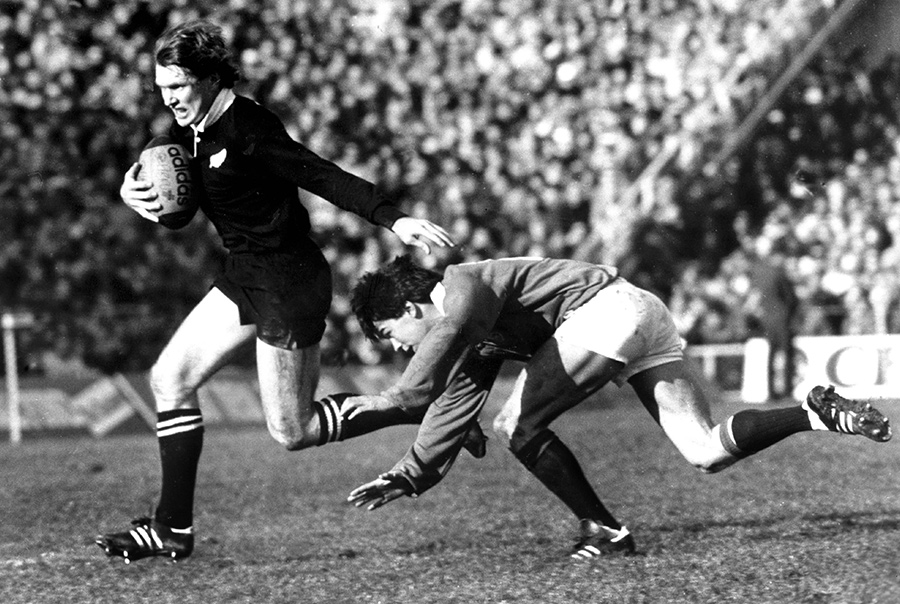

Stu Wilson in action against the British Isles at Eden Park, Auckland. New Zealand All Blacks defeated Lions 38-6, 16 July 1983. Photo: PHOTOSPORT
Stu Wilson – Mighty, Not Fallen
19th June 2025
When former All Black great Stu Wilson died last week accolades flowed, but there was one detail that seemed inconsistent with the life of a sporting legend – his last job. Greg Bruce on the man who walked tall till the end.
When the sad news broke last week that All Black great Stu Wilson had died, aged 70, the news reports were full of the usual tributes that follow the death of a sporting icon: his athletic prowess and achievements, his dedication and professionalism, the respect in which he was held by teammates and opponents alike. But one fact stood out: his last job had been as an orderly at Tauranga Hospital.
It felt so incongruous; it seemed so unlikely. Not just a hospital orderly, but an orderly in … Tauranga? It was so far from the sites of his glory days at Wellington’s Athletic Park and Eden Park and the country’s other great rugby stadia of the late 1970s and early 80s, when his job was to score tries for the All Blacks at a time when that job was more highly esteemed than any other in this country. It was a job at which he excelled. He was one of the best to have ever done it. He was famous, respected and beloved for it. He was not paid.
His career was cut short in 1984 because he had breached the rules of the day by receiving royalties from a book he’d written with fellow All Black Bernie Fraser. A decade later, rugby went professional. By 2021, when he began working as an orderly in Tauranga Hospital, the game’s top players were earning more than $2m a year. Today’s Stu Wilsons need never again work once their rugby careers are over, and certainly not as hospital orderlies.
At Tauranga Hospital, his job involved emptying rubbish, dealing with soiled bedding, ferrying medical equipment around and moving patients who couldn’t move themselves. His job was unskilled and largely unnoticed. Although he was paid, as with most jobs requiring hard and important work, he was not paid much.
It was hard not to think of Wilson’s career trajectory in terms of a fall. It was hard not to think about the actual value of the things we value. What’s it like to go from being cheered by 50,000 people at Eden Park and adored by millions more, to being appreciated by only a handful of people, most of them quite ill?
When the news broke in 2021 that he had started work as an orderly, Wilson gave a series of interviews. He talked about his reasons for taking the job: He had been working as a real estate salesperson but had retired and now wanted to get out of the house a couple of days a week; he wanted to give back to the hospital that had saved his life when one of its doctors inserted a stent in one of his arteries; he enjoyed the craic.
After Wilson’s death last week, his former boss at the hospital put it like this: “Stu said at the interview that it wasn’t about the money or things like that, he just wanted to give back to an environment that helped him along the way and gave him a few extra years to live after the cardiac problem he had.”
For most of us, life is an anonymous striving for security, happiness, meaning or something else we can’t quite articulate. For Stu Wilson, it was no different, except for a brief period filled with unimaginable glory, national adulation and international fame, which meant he had to forever forego anonymity.
In the tributes to him last week, many people noted his sense of humour and way with words. He had done many jobs since rugby. He’d been on the paid speaking circuit, performed rugby commentaries, hosted sporting broadcasts and so on. He’d spent nearly a decade in the real estate game. He was a dad. In photos and videos accompanying the news stories about his hospital work, he was always smiling – the same smile that had been one of the country’s most famous and luminous in the late 70s and early 80s.
We live lives that are made up of many parts. Some of them catch the light, some don’t. Stu Wilson was most famous for his rugby, but if we are remembered for our greatest achievements, what could be greater than embracing a life of anonymity and service after a life of glory and adulation?
Murray Mexted, that other great rugby character of the late 70s and early 80s, said last week that teammates used to call Wilson “Super Stu”. In keeping with rugby tradition, that is a truly unimaginative nickname, but in light of what we now know, no one could dispute it.
